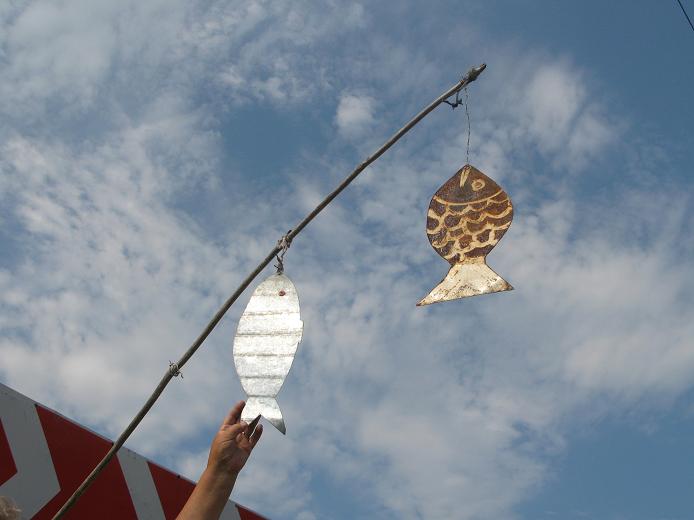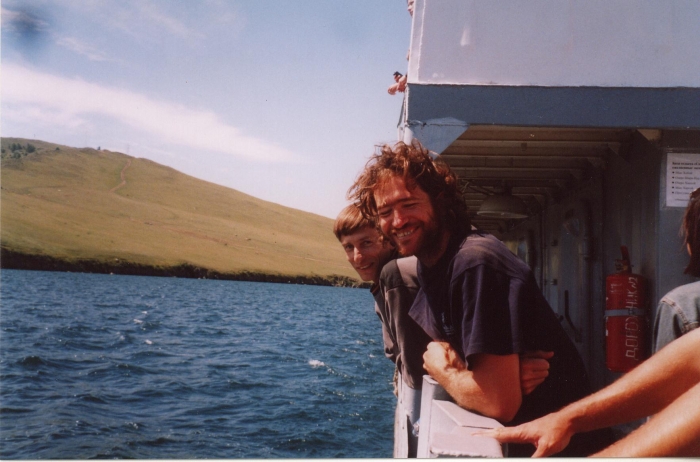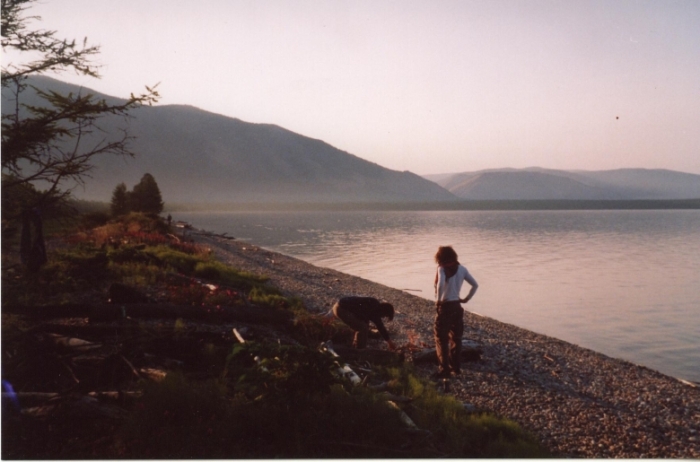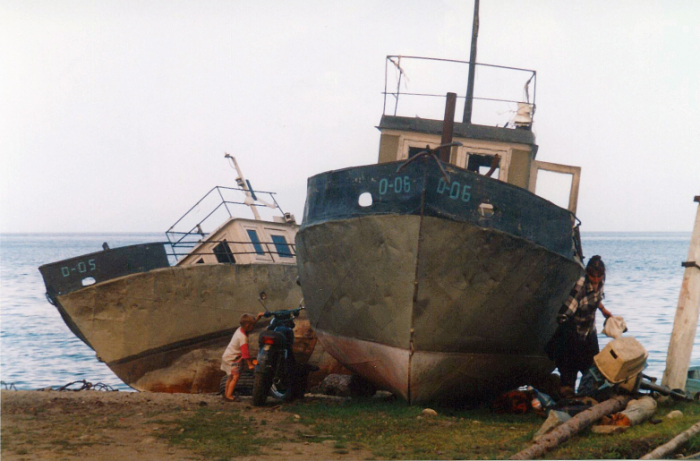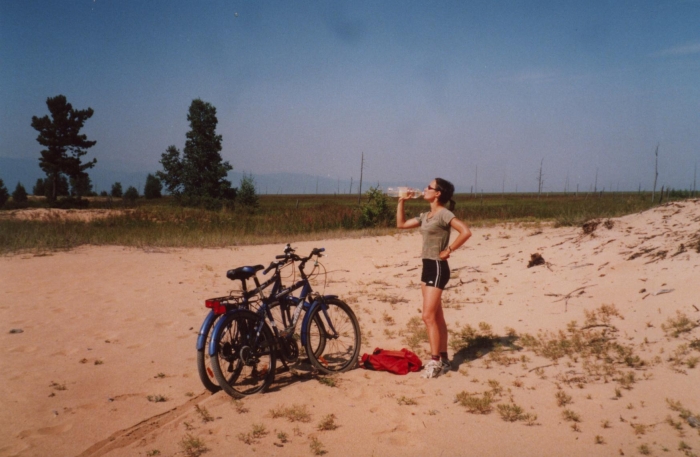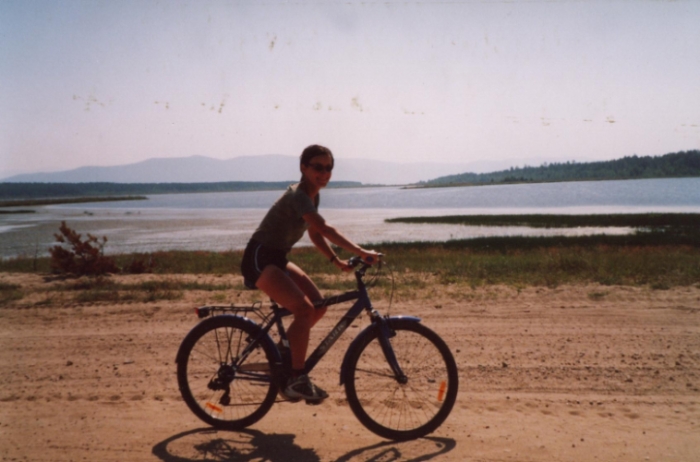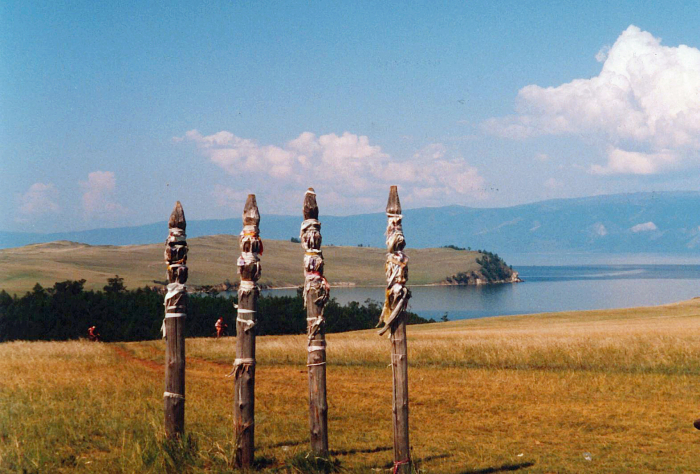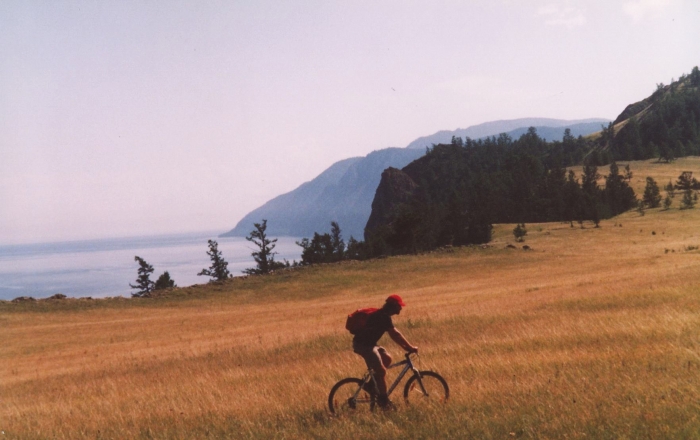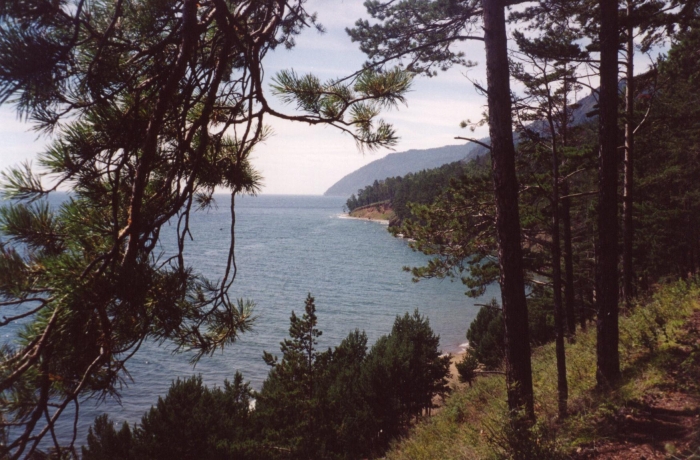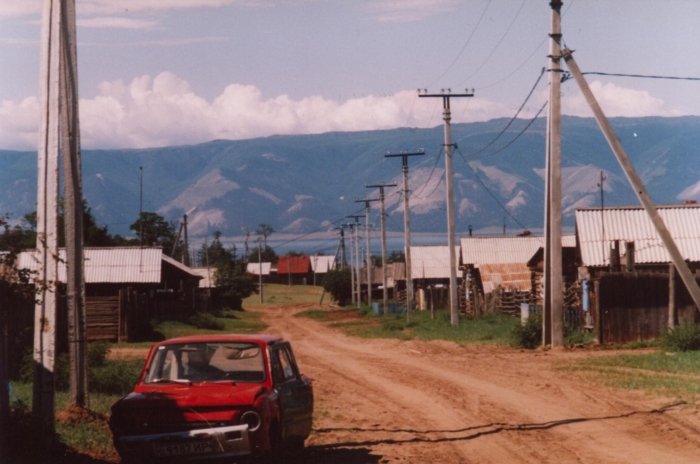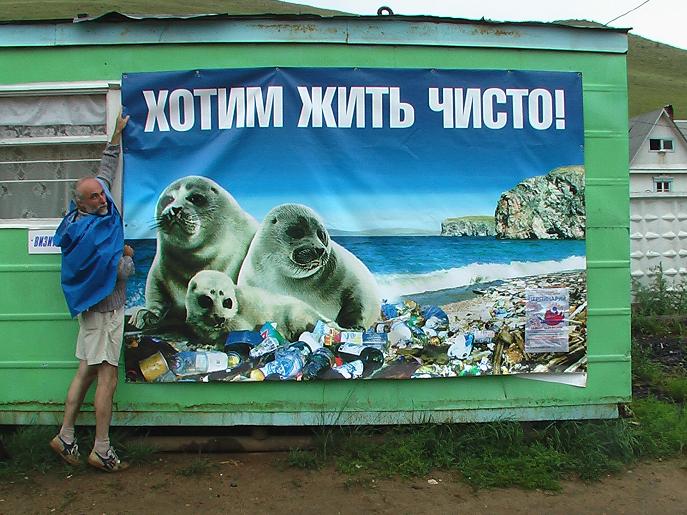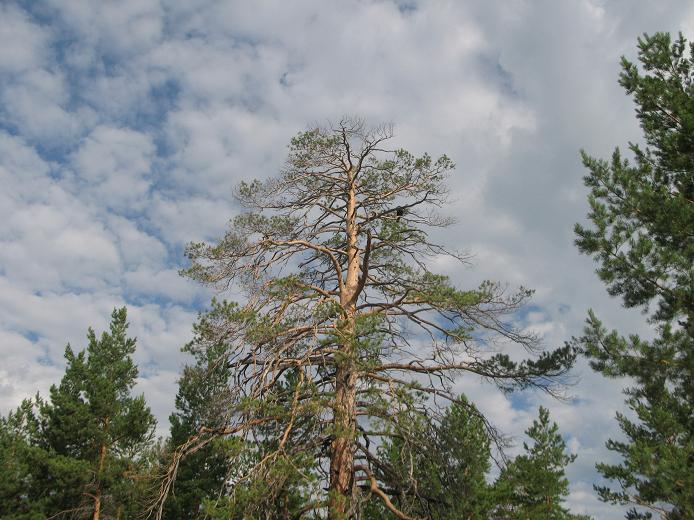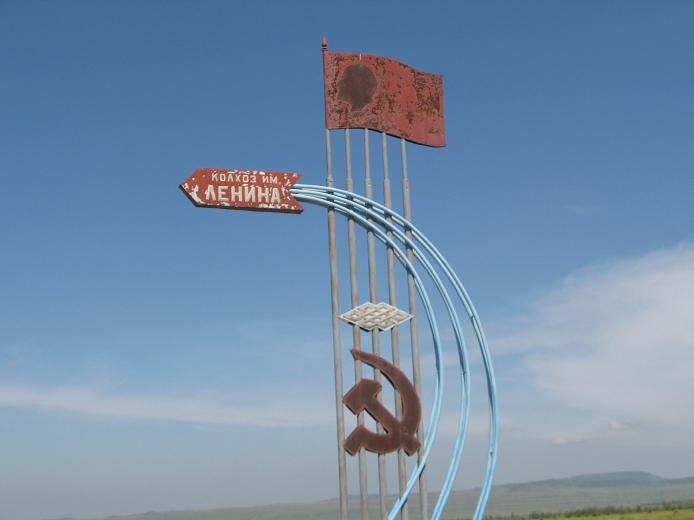 English / Spanish - click below
English / Spanish - click below
 English / Spanish - click below
English / Spanish - click below
|
Cet article fait partie de la thèse de journalisme de Goska écrit durant son reportage en 2005. Le lac Baïkal est un symbole de la nature sauvage de Sibérie, incroyablement vaste mais fragile à la fois. C’est pour cette raison que nous l’avons choisi pour terminer notre périple asiatique en vélo.

“There’s no fish,” says the girl cautiously observing us from behind the counter of the only shop in the Siberian fishing village of Baikalskoye. Below the village, fishing boats are moored on a sandy shore that steeply descends into lake Baikal, the world’s most bio-diverse lake. “The fish have gone,” Vika Pietrovna, 39, explains, watching us from a chair by the counter. Now there is no work, apart from hunting seals, so people leave as well and many houses stand empty. In the absence of fish for lunch we ask about accommodation, but Vika tells us there is no place for us to stay either.
We can’t be the first tourists to be asking Vika about a place to stay in Baikalskoe : with an enthusiastic recommendation in Lonely Planet, this charming wooden village draws backpackers daily. Yet there is not one house offering rooms for rent, or even a home-cooked lunch. The thing that seems to be missing is initiative. “The problem is that we have no nachalnik [director], like we had in communist times,” complains Vika Pietrovna.
Ever since the Iron Curtain rose and opened Russia up to the world, lake Baikal has been drawing more international tourists each year with its wild and unique nature. It is home to the richest lake ecosystem in the world, with over 1,500 species of plants and animals, most of them not to be found anywhere else on earth. With such natural riches, the development of eco-tourism around Baikal would seem inevitable. The problem is that many people still have a soviet-era mentality – the state is responsible for organising everything, and without the leadership of an official they are lost.
Fortunately, with over ten years since the collapse of communism, new ideas are filtering through. In other, less remote villages around Baikal, local people are creating their own alternatives to traditional work in industry, logging, fishing and hunting, of which there is not enough to go around anyway. From bed-and-breakfasts to seal-watching tours, home-built catamarans and museums of indigenous culture, local people are using their newfound right to private initiative to capitalise on Baikal’s forgotten natural resource – wild nature. Eco-tourism, a way of making a living from the environment without destroying it in the process, is gaining force.
Oil, wood and wildlife
Under Russia’s new capitalist system finding an alternative to resource exploitation has become a question of survival for the lake’s ecosystems. Siberia has always been the Wild East of Russia, the land of gold, furs, precious stones and fast money. When Russians colonised this far-flung part of Eastern Asia in the 17th century, furs were where the money was ; these days it is in gas, oil, minerals and wood, but the old mentality remains.
Although resource exploitation has not increased over the post-communist period, environmental controls have taken a nosedive. Baikal’s ecosystems are already buckling under the strain of fishing, hunting, logging and paper production. The problem is not the ‘how much’, but the ‘where and when,’ explains Viktor Kuznetsov, director of the forest campaign at the NGO Baikal Environmental Wave and former forester. Logging along the coast or in ecologically sensitive areas causes erosion and degrades ecosystems, for example.
As for the water, it is still very clean, crystal clear, and good enough to drink. Water from the depths of Baikal is even sold in bottles, despite polluted tributaries and a paper mill built in the sixties still discharging wastewater and polluting some areas along the Southern shore. What saved Baikal so far is its depth and size. In the centre of the lake, the cold waters plunge more than a mile before reaching the lakebed, making Baikal the deepest lake in the world. More resembling a sea, lake Baikal contains an unbelievable fifth of the globe’s total unfrozen freshwater. Its sheer volume helped it come out of the communist era relatively undamaged.
Now plans to build an oil pipeline along the earthquake-prone northern shore can be added to the list of environmental threats. Scientists fear that life in the lake may not survive the thousands of tonnes of oil that would enter it in the event of a spill. Still, many locals in the depressed North Baikal area hope that the pipeline, linking Eastern Siberia with the Pacific Ocean, will also bring work.
Eco-tourism provides a new, alternative direction of development for the area. Of course it is unrealistic to expect all the jobless pipeline supporters, fishermen, hunters and loggers to find work in eco-tourism as of tomorrow. But as well as work, which it already provides for some, eco-tourism gives locals control over their own future that working for big logging or oil companies does not, and makes people see an economic value in the preservation of nature itself. Perhaps this is what is needed if New Russia is to notice the worth of lake Baikal’s unspoilt wilderness.
A lot to lose, a lot to gain
For now, Baikal remains an eco-tourist’s paradise. The lake is by far the most bio-diverse in the world, with over 1500 species of plants and animals, including the nerpa, the world’s only freshwater seal. Its waters stretch from the Mongolian border northwards across a distance the length of England, intermittently set against the background of high mountains, steppe, sand dunes and taiga teeming with wildlife - eagles, lynx, wolves, brown bears, as well as more exotic species like musk deer and flying squirrels. The strangely exotic mix of Russian and indigenous Siberian cultures with Shaman, Buddhist and Orthodox Christian religious traditions adds an otherworldly setting.
While visitors enjoy the lake’s wild nature, for most of the inhabitants of villages like Baikalskoye the idea of making a living out of the tourists seems strange. “We don’t have big comfortable hotels for the tourists,” says Vika Pietrovna back in the little shop with no fish. In the centre of the village the fish Kolkhoz [communist fishing collective] stands shut, dusty announcements of five-year plans barely visible behind the dirty windows. Ms Pietrovna worked here until the kolkhoz closed down soon after the end of communism. The fact that she and the other villagers have never worked anywhere else makes their lack of enterprising spirit easier to understand.
New wave
Two days’ hike east along the shore from the village of Baikalskoye, young Russians and Americans are hacking through the taiga. They are building the Great Baikal Trail (GBT), Baikal’s biggest eco-tourism project to date. For the third summer now, hundreds of Russian and international volunteers, most of them young, have been clearing a path through the dense Siberian forest and building campsites along the way. The trail is designed to give tourists access to the Baikal coast, and to make up for the lack of traditional tourist facilities.
But the main aim of the project is to change attitudes, says Ariadna Raida, one of the project’s co-founders. “[The volunteers] working on the trail get a practical understanding that they can change things. If young people in Russia don’t have that, it’ll be the Soviet Union all over again : do what they tell you from the top, don’t ask questions, don’t take initiative,” says Ariadna.
The Great Baikal Trail, funded by the United States Agency for International Development, is the first conscious attempt at encouraging eco-tourism around the Baikal, and in Russia too, says Andrei Sukhniov, who started the project three years ago together with Ariadna. “The beginnings were interesting, before this started we didn’t really know what eco-tourism meant,” says Andrei. “Even the Russian word for ‘trail’ – ‘tropa’ – comes from trapping, killing animals. The idea of walking along the coast just for the sake of it was new to people here.”
Perhaps the deepest challenge eco-tourism faces is changing people’s mentality, says Ariadna. “So many Russian people are still Soviet people, with Soviet thinking. (…) Many, many people don’t believe anything depends on one person,” she says. “That’s why the first thing to do is to give people education, especially young people.”
Idealists and businessmen
Eco-tourism initiatives are spreading as locals realise that many tourists come to the Baikal for its unique nature and local culture, and not for comfort and big hotels. But the motives behind the initiatives vary. ”For people to protect nature they need to see economic benefit in it,” says Andrei Sukhniov of the Baikal Trail. Alexandr Fiedorenko, responsible for tourism and sport in the regional administration in the town of Severobaikalsk on lake Baikal’s northern shore, disagrees. “Even without money, we Russians love our nature. We want it for our family, for our children and grandchildren,” he says.
Elizabeta and Vladimir Shelkovnikov clearly fall into the first category. Having sold their own house and taken a bank loan, they have been building their own “Ecological Park-Museum” for seven years now. Designed around the three nations inhabiting the Baikal coast – indigenous Buryats, the Evenk tribe, and Russians – their project couldn’t have less in common with the stuffy interiors we normally call museums. The couple has almost finished building the complex of Buryat yurts, Evenk wig-wams and Russian wooden houses, surrounded by gardens filled with local medicinal and culinary plants.
“This was my dream since I was 20 years old. In communist times I couldn’t do a thing, so I travelled and learnt instead,” says Vladimir Shelkovnikov, 58, an artist by profession. His idea is simple. “We’re just using what was here in the first place - our local things, culture, nature, art, clothes. That’s what ecology means for me. And that’s what tourists come all this way for,” he says.
Other eco-tourism pioneers are more profit-motivated than the Shelkovnikovs. Businessmen Youri Nemirovsky, the owner of Baikal Complex – a company providing eco-tours and accommodation in hotels – is helping fund waste disposal projects and sponsors the Great Baikal Trail-builders. His business depends on the lake and its shore being clean and accessible, he explains.
Many locals work in eco-tourism on a much smaller scale. Ivan Kalikin, 35, built his own wind-powered catamaran and takes tourists on boat-rides as an alternative of getting into a marshrutka [collective minibus that is the main form of transport here]. Alexandr, who works as an inspector in Zabaikalsky National Park, supplements his 3000 rouble [US$100] monthly salary by renting out rooms in a traditional Siberian wooden house that he built himself, complete with a Russian banya (sauna). “Tourists want our traditional, Siberian culture, not plastic materials imported from China. And some people are using that to build tourist accommodation on the Baikal coast, believe me,” he says.
Many more tourists come to the village than there is accommodation for, he says, and they end up camping. “Many people around here would like to work in tourism, but they don’t know how to start. Hopefully what I’m doing will act as an example,” he adds.
Capitalist fish
But old habits die hard, and Siberia is no exception. Most people in Alexandr’s village of Ust-Barguzin still live from fishing – as they did in Baikalskoye, until the fish ran out. The reason is the lack of controls since the end of communism, says Evgeni Ovdin, scientific director at the Zabaikalsky National Park, which lies on the eastern shore of lake Baikal. “Now there is no fish left in the very North of Baikal, nor around the city of Irkutsk, nor in the Southern tip of the lake. In practice, fishing is completely uncontrolled now,” he says. “The old [communist] system of controls is broken, and the new one doesn’t work,” says Mr Ovdin.
“These people have been fishermen all their lives. Everyone is a fisherman here, and many of them can’t imagine doing anything else. Our biggest holiday is the 19th of July – the Day of the Fisherman. They fish whether it is legal or not,” says Vladimir Mielnikov, the director of the Zabaikalsky park.
The problem now is the poverty of the population combined with lack of funding for the park. “They catch the fish, we catch them, but we don’t have enough resources to control the situation,” Vladimir Mielnikov complains. He runs a national park of an area of 270 thousand hectares with 68 workers – i.e. almost four thousand hectares per employee.
Of those who are not fishermen, most locals work in logging. Evgeni Ovdin says that although illegal logging in the park is not a problem, it goes on just outside of it. “They come in the night, and get all the wood away on a truck or train to China before the morning,” he says. Even when it is legal, logging can be harmful, because environmental laws have become much less stringent. “In communist times we had a 100 km protective zone around the coast. Now, they cut forest 2-3 km from Baikal, and it’s legal. It causes erosion, but not only. They are cutting old forests, forests that have always been there. The equilibrium of ecosystems is being disturbed. Wetlands are drying up before our eyes,” says Mr Ovdin.
Yana Ogorkova, eco-tourism programme leader at the NGO Baikal Environmental Wave, agrees : “There is a special law protecting the Baikal environment, but it is too general and the measures are not clear,” she says.
Eco-tours cannot help change the law, but they certainly help with the park budget. Andrei Sukhniov and Ariadna Raida of the Great Baikal Trail project also organise eco-tours in the Zabaikalsky national park. Although still irregular, one tour can provide the equivalent of a fifth of the park’s entire annual budget.
At the same time eco-tourism helps ornithologists, national park workers, and other trained professionals find employment. “Baikal has enormous human potential for eco-tourism,” says Yana Ogarkova of Baikal Environmental Wave. “Scientists, ornithologists, zoologists and biologists need work,” she says. Zhenia, 40, a former researcher, is one of these biologists, and is re-training as an eco-tour guide. “There is no money to pay researchers in Russia now. It’s strange to be a trainee at my age, but it pays at least,” he says.
Wild tourism
But even the greenest independent initiatives run by environmental experts run into problems that are outside of their control. Apart from the dysfunctional environmental legislation, there is the wider problem of inaction on the part of regional and federal powers. How do you develop eco-tourism in an area where waste collection and sewage systems are rare phenomena ? The best you can do is take your rubbish with you, says Ariadna Raida, admitting that the sewage problem is not as easy to solve.
The Baikal is enormous, and that is what has kept it clean so far, but big concentrations of tourists in one place can disturb the balance. “What makes it worse is the transport,” says Vladimir Mielnikov. “You’ve seen the state of the roads. All the tourists end up camping in one place – wherever they can get to most easily. That means a lot of rubbish in one place, and there are no toilets.”
Zabaikalsky park has made an effort to collect rubbish, but the effort would have to be uniform around the lake for it to bring the desired effects. “We put rubbish bins at the hot springs on the coast. But our hot springs suddenly became the most popular place on the Baikal to get rid of rubbish, because we’re the only place on the Baikal that collects rubbish, and all the yachts and ships started coming here,” says Vladimir Mielnikov.
The national park management also wanted to improve the road into the park, but decided against it, fearing the same scenario with motorists invading along the only good road to the coast. “Development of infrastructures used by tourists has to be roughly uniform,” says Vladimir Mielnikov. A lack of government involvement means it is not.
Government inaction also means that any green tendencies within tourism come from private initiatives, and that these initiatives depend wholly on what tourists want. The result has been that, along with eco-tourism, a very un-green type of tourism has been developing, with masses of motorists descending on the most accessible beaches in good weather. . Vitaliy Riabtsov, ornithologist and Baikal expert, says he has witnessed wild tourism seriously damage lake Baikal over the last ten years. “After the perestroika, education and government environmental controls nose-dived. Nature was given up for sale and plunder. Tourism is just one of the manifestations of this,” he says. He blames government inaction and tourists’ ignorance for the near-extinction of half a dozen animal species – water birds, wild ponies, lynx, vipers – from Olkhon, lake Baikal’s biggest island, home to the village of Khuzhir and several other settlements.
Despite Olkhon fast becoming lake Baikal’s number one tourist destination, there is still not one public toilet on the island. Electricity arrived on Olkhon on July 30th 2005, and further development of the road leading to the ferry linking it with the mainland is planned. According to Anna Kharanutova, tourism specialist in the Olkhon regional administration, twenty thousand visitors stay on the island each summer. The majority of them are “wild” tourists, living in tents with no sanitation or waste disposal system.
Environmentalists fear that electricity will make current problems with rubbish and sewage worse. “Together with the growing stream of tourists a stream of rubbish will pour onto the island,” says Roman Vazhenkov, director of Greenpeace Russia’s Baikal programme.
“It’s all right to give people comfort, but mass tourism cannot work here. The administration wants good roads, big hotels, civilisation. The coast will lose its magic - the enchanting wild nature, the peace and quiet,” says Yana Ogarkova.
Can’t have it both ways
Eco-tourism or ‘dirty’ tourism and industry - in the long run these are mutually exclusive directions of development for the area around Baikal. The town of Baikalsk on the lake’s southern coast, created in the sixties around the pulp and paper mill, is testimony to this fact. The mill still discharges 45 million cubic metres of wastewater into the lake each year, but no longer provides enough jobs for the town, where it is practically the only source of employment. Attempts to develop tourism are cut short by air and water pollution.
“It smells too much, and the factory on the coast is visible from far away. We have a skiing resort now, but they’ll never get Western tourists, or tourists from Moscow,” says Natalia Lebiedeva, the receptionist at Baikalsk’s only hotel. She had worked at the mill until the massive redundancies that followed the fall of the Soviet Union. “Now there’s no future here. People drink a lot,” she says. “I would take my son and leave, but I have no-where to go.”
So far, pollution from industry remains limited to small areas like Baikalsk, as Baikal’s size and volume saved it from the fate of the much shallower Aral Sea. But the effects of oil spills from the planned pipeline would reach the whole lake. Together with wild tourism, logging and poaching, this could mean the end of Baikal’s natural riches.
